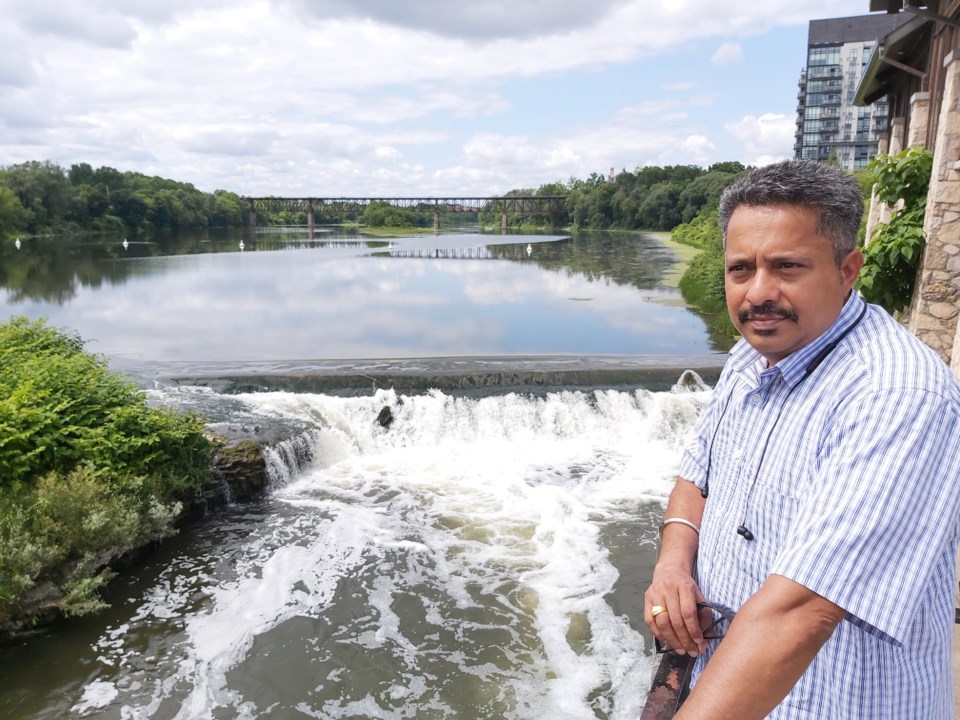A Six Nations staffer said there are several worrisome factors around a request by Cambridge residents to scatter human ashes in the Grand River
"As Six Nations, as traditional peoples of this territory and stewards of the river, we have a number of concerns with this," Robbin Vanstone, consultation supervisor, lands and resources department, Six Nations of the Grand River. From the use of this sacred element to the effects human ashes will have on the environment within it, she said, there is much to consider.
Vanstone was talking to CambridgeToday about a discussion held at city council in April. That's when Cambridge resident Prakash Venkataraman, spoke at a council meeting requesting there be regulation allowing the community at-large to scatter the ashes of their loved ones in the Grand River.
It isn't about faith, ethnicity, or cultural background, he said recently, it's about how people want to grieve their loved ones.
"Currently over 70 per cent of Ontarians cremate their loved ones," said Venkataraman. "People have been scattering ashes in the Grand River for the last 40 plus years. Currently, they do that with guilt and fear because there's no regulation, there's no law that says it is allowed or not allowed. It is a grey area."
He said when one grieves, it should be with peace of mind.
"That is very significant about it," said Venkataraman.
The belief is this: the body is made of nature.
"Once life is over, you offer your body back to nature," said Venkataraman, adding scattering of ashes is currently allowed on Crown lands, in provincial parks, and lakes and waterways, "but in Region of Waterloo, we don't have a lake or a provincial park but we have the river."
That's why he wants to regulate the process, he said. Every organization or level of government Venkataraman reached out to told him they didn't have authority over the river. Eventually, he discovered who actually does have authority over the river.
"The water is owned by the Six Nations," he said. "As per the (Haldimand Treaty), six miles on both sides of the river is really owned by the Six Nations."
That's why Venkataraman wants Cambridge council to approach the Six Nations council for conversation on this matter.
But Vanstone said no one from the City of Cambridge has reached out to her office to consult on this request.
"We're also very disappointed that this discussion is being held without our voice," she said. "We need to be a part of this conversation and we haven't been. That's very disappointing to us."
Then Vanstone outlined some of the issues.
"Our first and most important concern with the scattering of ashes is that for Indigenous people, and Six Nations is no exception, water is sacred," said Vanstone, adding she was not speaking in behalf if Chief Mark Hill or the Six Nations council, but only from the perspective of her department. "We appreciate that nations or other cultures have their customs and their traditions and we respect that. But they also must respect what's important to us."
Water is sacred, it's not something we dispose of things in, she said.
"We're worried about the environmental impact of this," Vanstone said. "For instance, human ash is heavy and it will sink. It doesn't just float down the river and disappear into the lake. It's heavy; it will sink. We're concerned about how it might affect the bottom-feeding fish. How is this going to affect the plant life within the river?"
Human remains, she said, quite often have heavy metals in them.
"Over the course of a lifetime, whether they've had pins put in their bodies or filling, there are heavy metals," Vanstone said. "We don't know what the impact to the water is going to be. Before any conversation about this can take place, we need to know what the full repercussions of this would be."
Additionally, she said, there's concern about those downstream using the river water as a source of drinking water.
"Communities downstream, ours included, get our drinking water from the Grand River," Vanstone said. "Even though the water is treated, it doesn't seem appropriate to us that the same river from which we consume our water, has been used as a burial site for human remains."
Because of all these concerns, she said, disposing of human ash in the river doesn't "make sense."
When asked about where he would see such a designated spot on the river, Venkataraman said, it could be anywhere on the Grand River or another flowing body of water.
However, he added, for any of this to come to fruition, discussions need to happen between the city and the Six Nations councils.
Allison Jones, supervisor of communications, City of Cambridge, wrote in an email that the city has and continues to receive correspondence on this topic.
"In the coming weeks, we will consolidate all communication and start our consultation with Region of Waterloo, GRCA (Grand River Conservation Authority) and provincial ministries for their guidance," she wrote. "We anticipate a report back to council by the end of the year."



